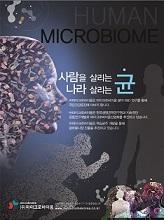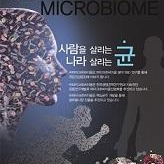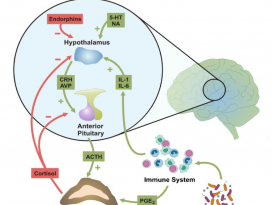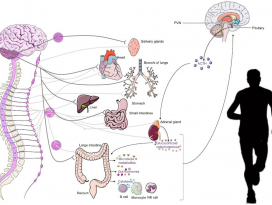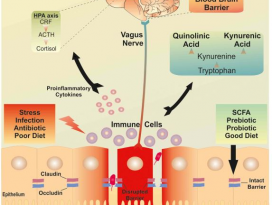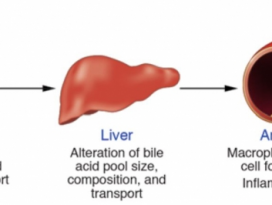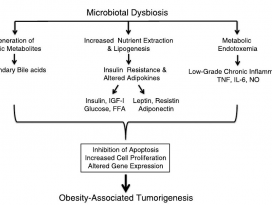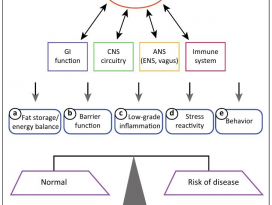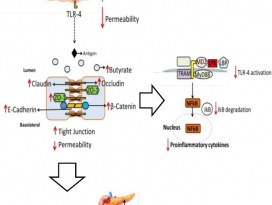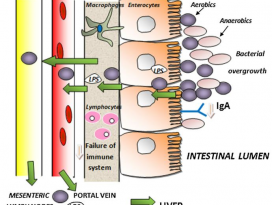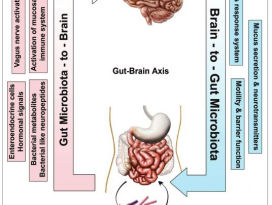[Gut Microbiome] Characterization of the human gut microbiome during travelers' diarrhea
- e 1917
Characterization of the human gut microbiome duringtravelers' diarrhea
Bonnie P Youmans, Nadim J Ajami, Zhi-Dong Jiang, Frederick Campbell,W Duncan Wadsworth, Joseph F Petrosino,
Herbert L DuPont & Sarah KHighlander
| Alterations in the gut microbiota are correlated with ailments such as obesity, inflammatory bowel disease, and diarrhea. Up to 60% of individuals traveling from industrialized to developing countries acquire a form of secretory diarrhea known as travelers’ diarrhea (TD), and enterotoxigenic Escherichia coli (ETEC) and norovirus (NoV) are the leading causative pathogens. Presumably, TD alters the gut microbiome, however the effect of TD on gut communities has not been studied. We report the first analysis of bacterial gut populations associated with TD. We examined and compared the gut microbiomes of individuals who developed TD associated with ETEC, NoV, or mixed pathogens, and TD with no pathogen identified, to healthy travelers. We observed a signature dysbiotic gut microbiome profile of high Firmicutes:Bacteroidetes ratios in the travelers who developed diarrhea, regardless of etiologic agent or presence of a pathogen. There was no significant difference in a-diversity among travelers. The bacterial composition of the microbiota of the healthy travelers was similar to the diarrheal groups, however the b-diversity of the healthy travelers was significantly different than any pathogen-associated TD group. Further comparison of the healthy traveler microbiota to those from healthy subjects who were part of the Human Microbiome Project also revealed a significantly higher Firmicutes:Bacteriodetes ratio in the healthy travelers and significantly different b-diversity. Thus, the composition of the gut microbiome in healthy, diarrhea-free travelers has characteristics of a dysbiotic gut, suggesting that these alterations could be associated with factors such as travel. |
제목
여행자설사(TD; Travelers' Diarrhea)를 겪는 동안의 장내 미생물군의 특성
내용
장내 미생물군의 변화는 비만, 염증성 장 질환 및 설사와 같은 질병과관련이 있다. 산업화된 국가에서 개발
도상국으로 여행하는 개인의 최대60 %가 여행자 설사(TD)로 알려진 분비성 설사를 얻고, 장독성 대장균(ETEC)과
노로 바이러스(NoV)가 주요 원인 병원균이다. TD는 장내 미생물총을 변화시킨다고추측됨에도 불구하고,
TD의 장내 환경에 대한 여행자설사의 영향은 연구된 바 없다. TD와 연관된 장내 세균 군집의 분석을 최초로 보고한다. ETEC, NoV 등혼합된 병원체와 관련된 TD에 걸린 사람과 식별된 병원체가 없는 TD에걸린 개인의 장내 미생물군을
검사하여 이를 건강한 여행자와 비교했다. 병원균의 존재 또는 기병성 인자의유무에 관계없이, 설사를 경험한
여행자들은 퍼미쿠테스:박테로이데테스(Firmicutes:Bacteroidetes) 비율이 높은 불균형적 장내 미생물군의 특징적
개요를 보임을 관찰했다. 여행자들 간의 알파 다양성에는 유의한 차이가 없었다.건강한 여행자들과 설사를 겪는
여행자들의 미생물군의 박테리아 조성은 유사하였으나, 건강한여행자의 베타 다양성은 병원체 관련 TD 그룹의
베타 다양성과 현저히 달랐다. 건강한 여행자와 ‘휴먼 마이크로바이옴 프로젝트’(인간 미생물군 프로젝트)에
참여했던 건강한 대상자의 미생물 군의추가 비교에서도 건강한 여행자의 퍼미쿠테스 : 박테로이데테스의 비율이
유의하게 더 높고 베타 다양성이상당히 다름을 보였다. 따라서, 설사가 없고 건강한 여행자의장내 미생물군
구성은 불균형적 내장의 형질을 가지고 있어도, 이러한 변화가 여행과 같은 요인과 관련될수 있음을 시사한다.
Keywords
: #Dysbiosis #EnterotoxigenicEscherichiacoli#E.coli #GastrointestinalDisease #Microbiome #Norovirus #Travelers’Diarrhea #TD
#장내미생물불균형 #장내미생물총불균형 #디스바이오시스#장독소생산성대장균 #소화기질환 #미생물군
#미생물총#마이크로바이옴 #노로바이러스 #여행자설사
[출처: Youmans, B. P., Ajami, N. J., Jiang, Z. D.,Campbell, F., Wadsworth, W. D., Petrosino, J. F., ... & Highlander, S. K.(2015). Characterization of the human gut microbiome during travelers'diarrhea. Gut Microbes, 6(2), 110-119.]
|
| ㈜마이크로바이옴 ㈜마이크로바이옴은 생명공학 최고의 기술력을 바탕으로 마이크로바이옴 산업의 성장과 발전의 선도적 역할을 하고 있는 대한민국 대표 마이크로바이옴 R&D 전문 기업입니다. ㈜마이크로바이옴은 생명공학 국가연구기관인 한국생명공학연구원과 마이크로바이옴 관련 상품에 대하여 공동연구개발 및 기술이전을 통하여 공동특허 출원과 마이크로바이옴 상품화에 성공하였고, 마이크로바이옴 글로벌 기업이 되기 위하여 연구개발을 지속하고 있습니다. |
| no. | 제목 | 조회수 |
|---|
㈜마이크로바이옴 ㅣ 서울시 서대문구 연희로 77-12 영화빌딩2층
Tel :02-322-0302 l Fax : 02-322-0759
Copyright (c) Microbiome. Co. All Rights Reserved.
